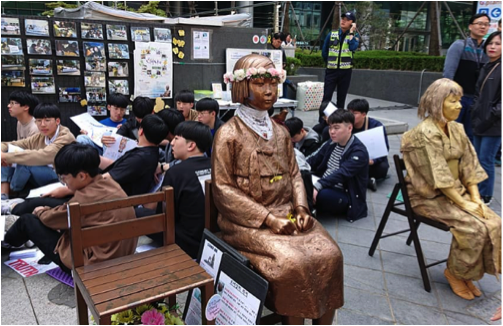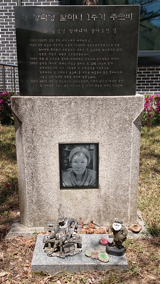Archive for May 2019
Yu-Ai May issue 2019 — Korean PAX report by Minao Capper
Yu-ai Friendship
Newsletter of the World Friendship Center, NPO
Korea PAX
Minao Capper
On my trip to Korea though PAX I wanted to find out what the Korean youth feel about peace, understand more about the historical problems between Japan and Korea, and experience the Korean culture. I especially think I now understand the issue about the Korean women forced to be sex slaves by the Japanese military, and I could see it from a different perspective than before.
On the first day, we joined a protest in front of the Japanese embassy. I was surprised that there were many young people, even though it was a national holiday. They were very different from the Japanese students who just sit there quietly because they were told to, but instead they were actively chanting and singing songs. The young people taking it upon themselves to act on what they think is really impressive and inspired me a lot.
On the second day we went to the house of sharing and learned about the horrific things that the Japanese military made these women do in wartime.
When we heard from the Harumonis it made me think that the terrible things that we saw in the museum had happened to these women sitting in front of me.
That thought made me tear up. Going to a Japanese school and studying the Japanese peace education all my life, learning about the truth for the Koreans hurt my heart. All the Harumonis want is a formal apology and for the stories of the so called “comfort women” in the school textbooks. I can’t understand why the Japanese government can’t do that. I said this at the Q and A after Matsumoto san’s story on the third day but, I think if we don’t learn about our past mistakes, we will not be able to achieve a truly peaceful future.
During the Q and A on our third night, I got to see many different perspectives while translating, and when I was asked about what the Japanese youth think or what kind of peace education I had, I did my best to answer those questions but I felt I wasn’t answering the questions as well as I could. Not many people are as privileged as I am to be able to take part in such trips so at the very least, I want to tell my opinions and my experience in Korea to my friends and teachers in Japan.
On our final day we went shopping with my host family, Coco and Austin.
When we got back to the peace building we had diner all together then got in a circle to talk about our memories during our stay. I am so thankful for my amazing host family and all the people who made this possible. I will never forget this experience.

Copyright © NPO World Friendship Center 2019 All Rights Reserved
Yu-Ai May issue 2019 — Korean PAX report by Shizuo Tachibana
Yu-ai Friendship
Newsletter of the World Friendship Center, NPO
2019 Korean PAX report
Shizuo Tachibana
I visited South Korea from April 30 to May 5, 2019 as group leader of the Korean PAX tour, the Peace Ambassador Exchange. I would like to share a few thoughts regarding this Korean PAX.
We visited the House of Sharing for victims of Japanese military sexual slavery on May 2. There we met one of the grandmothers, 이옥선 Ii Ukseon, and I apologized to her as a Japanese person. However, she said that she wanted an apology from the Japanese government, not from me. She said that she didn’t expect an apology from the Prime Minister, Shinzo Abe. Hearing that for her my apology meant nothing, I was shocked. At the political level between two countries, there are so many issues going on that need to be resolved. The grandmothers have seven demands, the Japanese staff of the House of Sharing, Mr. Tsukasa Yajima told us. The Japanese government has to answer to these seven demands, which the present government chooses to ignore. Is there anything left, then, that we Japanese citizens can do for these victims of sex slavery?
On May 2, after Ms. Masue Matsumoto shared her experience of the A-bombing, there was a question to her. ‘Why don’t the Japanese ask for an apology from the U.S.?’ She explained about a characteristic attitude of Japanese people to experiences in the past. The Japanese tend to forget what happened, as one releases incidents in the stream of memory. It is not only her, but many hibakusha don’t especially want an apology from the U.S. Instead they say that they don’t want anyone to experience what they did. I know that the Japanese have to apologize and seek to be forgiven because of the war. The Korean grandmothers need an apology from the Japanese government. However, I hope that as Japanese people continue to visit the victims of the sex slavery with their apologies and a heart of love, these may heal them and they will someday accept our apologies. I believe that this is one of the things that Japanese citizen could do about the past.
In the end, I would like to express my sincere thanks to the Peace Building Community for their warm welcome and commitment to this program dedicated to peace between our countries. I hope that Korean PAX will continue to contribute to the peace of this region.

Copyright © NPO World Friendship Center 2019 All Rights Reserved